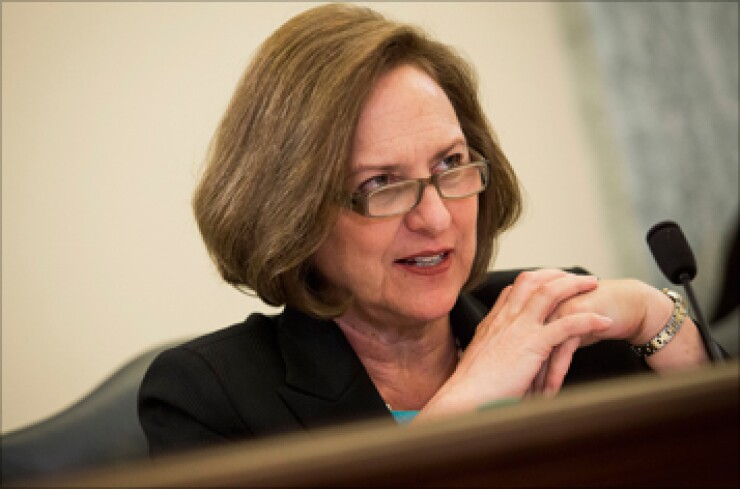
DALLAS — The $11.6 billion for a new freight-related highway program is a key feature in the Senate's bipartisan DRIVE bill that would extend federal transportation funding through 2021, Transportation Secretary Anthony Foxx and Sen. Deb Fischer, R-Neb., said in a joint editorial published Thursday in a Lincoln, Neb., newspaper.
The new National Freight Program in the legislation, H.R. 22, that the Senate passed on July 31 accounts for much of the additional $28 billion of transportation infrastructure funding over six years provided by the $273.4 billion measure.
A robust freight-handling transportation infrastructure is essential to the nation's economy, Foxx and Fischer said in their op-ed.
"By producing a strong multimodal freight plan — one that facilitates the flow of goods between rail, water ports, trucking hubs, air cargo centers, and highways — we will enhance our transportation network and create economic growth," they said. "With a long-term infrastructure strategy, proper coordination at all levels of government and a robust freight policy, we can address our nation's transportation challenges head on."
The proposed $11.55 billion freight program in the DRIVE Act would be funded at $991.5 million in fiscal 2016 and increase each year to $2.5 billion in fiscal 2021, according to an analysis of the measure by the American Road and Transportation Builders Association.
Projects at ports and airports would be eligible for grants under the freight program, but 90% of the funding would be dedicated to highway projects.
The freight funding would be allocated to states by a formula, but a state would have to create its own investment plans before participating. A national freight network consisting of the Interstate system and other roads would be designated by the Transportation Department and the states, with the network updated every five years.
The Senate bill also would create a new $2.1 billion program for major highway projects that would take up a large portion of a state's federal highway funds. An eligible project most cost at least $350 million or take up 30% of a state's annual funding, whichever is lower.
The Senate transportation bill will be considered by the House when Congress returns after Labor Day from the August recess. The House has yet to develop its multiyear transportation bill, but Rep. Bill Shuster, R-Pa., chairman of the House Transportation and Infrastructure Committee, has pledged to bring one up for a vote by the full House in early October.
The current 90-day extension of federal transportation funding will expire Oct. 29.
Meanwhile, Fischer, who is the chairman of the surface transportation subcommittee of the Senate Committee on Commerce, Science, and Technology, introduced the Build America Act, S. 1296, in May that would establish a national infrastructure bank. Fischer's proposed American Infrastructure Bank would be initially capitalized with up to $30 billion by taxing corporate overseas earnings that are voluntarily repatriated.
States could deposit 60% of their federal transportation funding in the infrastructure bank in exchange for more control over environmental approvals and construction design of infrastructure projects.
The state would receive back 90% of its remitted federal funding as grants for core infrastructure projects with 10% available as low-interest project loans under Fischer's proposed bill.
In the House, Rep. Rosa DeLauro, D-Conn., introduced a bill, H.R. 3337, in late July that would create the National Infrastructure Redevelopment Bank.
DeLauro said the bank would leverage public and private dollars to fund infrastructure projects of national or regional significance.
"Existing funding at the federal, state, and local level already lags way behind," she said.
The proposed infrastructure bank would be authorized to issue bonds with the interest subsidized by the federal government.
The bank would fund up to 50% of a project's expected cost. Eligible projects would highways, ports, community broadband systems, and water supply and treatment facilities.





